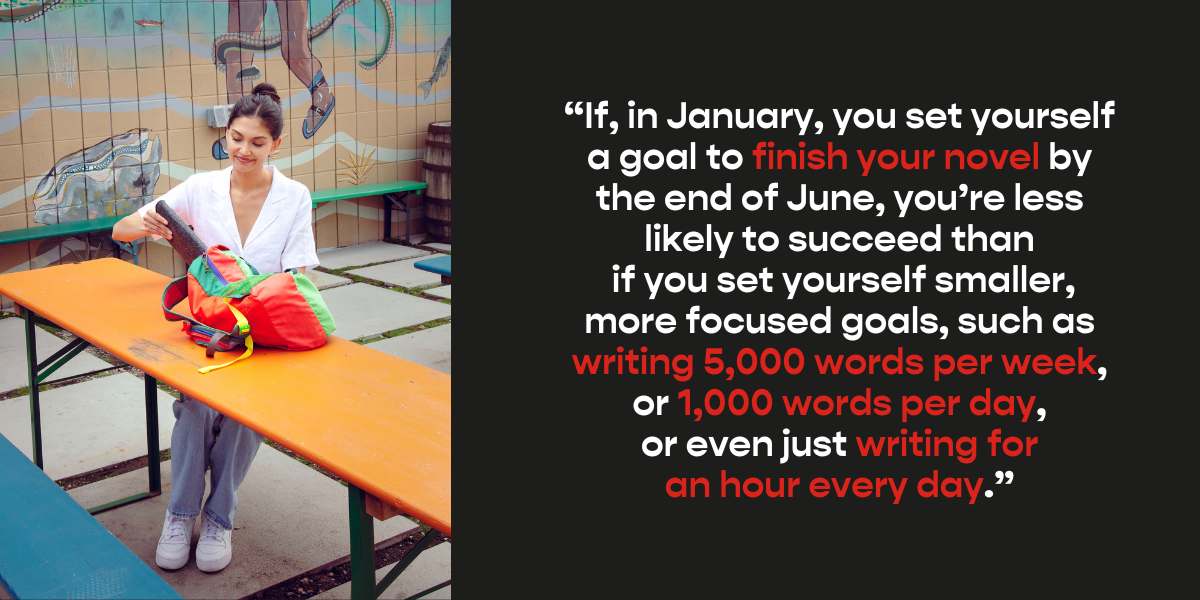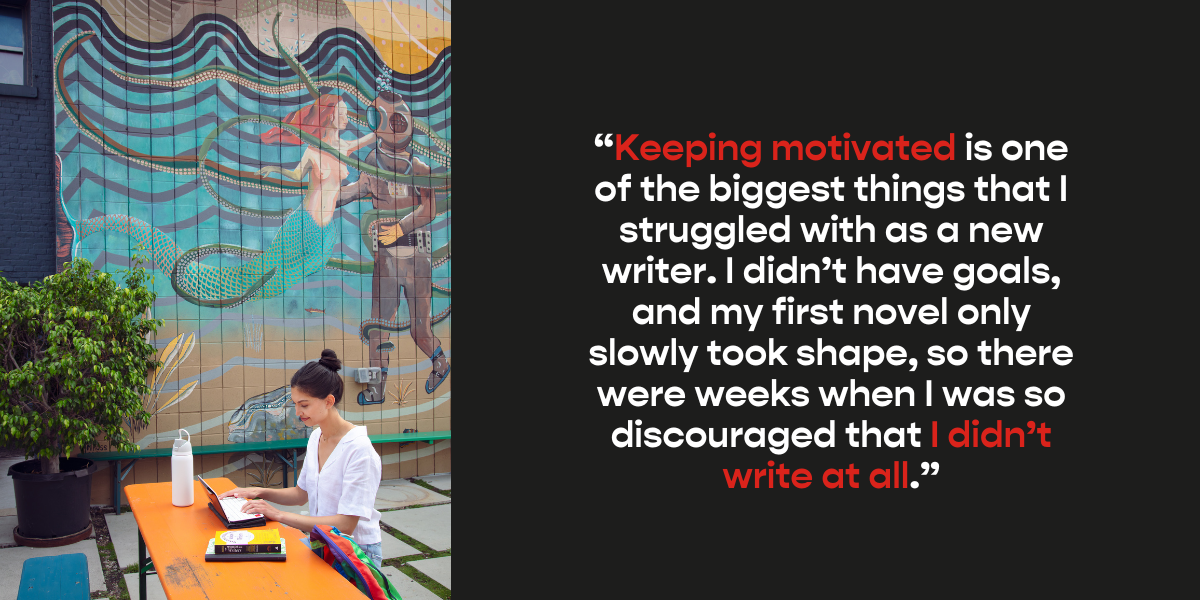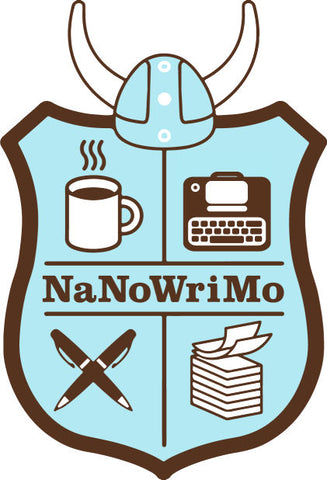
According to Psychology Today, setting achievable goals is a sure path to higher achievement. Every writer longs to be more productive, so is something as simple as setting achievable writing goals really the answer?
Setting a goal alone isn’t going to make you more productive. You have to be consistent, set aside time to write — and you have to keep doing it. But concrete goals give you something tangible to work toward, and that is often the difference between completing a manuscript and giving up entirely.
In this article, we're taking you on a whistle-stop tour through the psychology of writing goals, the benefits of goal setting, and the efficacy of intensive goals (like NaNoWriMo).
Ready? Let’s jump in!
The Psychology of Goal Setting
Goal setting doesn’t just apply to writers, of course, but the psychology behind goal setting certainly does shed some light on why writers who set achievable goals tend to be more productive andsuccessful.
There’s been a lot of research into the links between goals and success (see, for example, Kleingeld et al, 2011 and Locke & Latham, 2006). People who set goals are more self-confident, have higher levels of motivation, and are more independent. It’s not just about setting goals, either. In 2015, psychologist Gail Matthews revealed that writing down your goals makes you 33% more successful in achieving them compared to people who simply set a goal in their heads.
Psychologists also suggest that it’s not just writing down your goals that affect the likelihood of you achieving them, either. The type of goal that you set yourself also makes a big difference. 92% of people struggle to stick to the goals they’ve set — and often that’s because the goals aren’t clear or specific enough.
For example, if, in January, you set yourself a goal to finish your novel by the end of June, you’re less likely to succeed than if you set yourself smaller, more focused goals, such as writing 5,000 words per week, or 1,000 words per day, or even just writing for an hour every day. These kinds of goals are both more achievable and more measurable.
Writing goals are what psychologists class as "performance goals" (the other main type is "learning goals"). Performance goals mean that you’re focused on the end result — but you need to be cautious not to get too fixated on this end result. Becoming fixated on the results of your writing goals can be counterproductive in that you can become anxious about your success (or failure).

How to Set Writing Goals That Actually Work
If you set a goal that you can’t realistically achieve, you’re going to feel frustrated and demoralized. Goal setting should keep you motivated, not make you feel like a failure. So how do you set writing goals that actually work?
I’m going to share with you three top tips for effective goal setting that bestselling authors use for their own writing goals.
1. Be Realistic About What You Can Achieve
When you set realistic goals, you’re setting yourself up for success. Your writing goals have to be achievable — and in order to set realistic writing goals you need to be honest with yourself about what you can do.
For example, if you know that, on average, you can write 500 words in an hour, and you usually have around two hours a day that you can devote to writing, it wouldn’t be realistic to set yourself a goal of 2,000 words per day. It’s not achievable, and you’re going to become frustrated with yourself.
Asking yourself these questions can help you to set realistic writing goals:
- How much time can you set aside for writing each day?
- How many words or script pages are you able to write (on average) in an hour?
- How many days a week are you able to set aside time for writing?
2. Set Goals That You Can Measure
When you are able to measure your progress, you become more motivated, so setting a series of smaller goals that work toward a larger goal is the most effective way to work with writing goals. That's part of the reason we created Postbox Profiles! This way, you can measure your progress in small steps rather than slogging towards a bigger goal.
For example, if you want to write a novel, the overall goal will be to complete the 80,000-word manuscript. However, working towards that huge goal can seem like looking up a huge mountain. Instead, break your larger goal down into smaller stages:
- Writing 1,000 words per day (5 days a week)
- Writing 5,000 words per week
- Writing a chapter a week
Because these goals are smaller, you have that sense of achievement each time you accomplish one, in addition to knowing that each goal you achieve is taking you one step closer to your ultimate goal.
3. Make Your Goals a Priority
You can set all the goals in the world, but if you don’t ensure that they’re a priority for you, then you’re never going to achieve them. When you’re setting your goals, therefore, you need to ensure that they are important to you — and that you’re aware of things that you might put ahead of your goals.
To set effective goals, then, you should start out by recognizing the pressures and responsibilities that you have in your life that may interfere with your ability to achieve your goals (i.e. things that you will prioritize over your goals). Understanding these things can help you to be more realistic when setting your goals, too.
Consider these kinds of questions:
- What things may keep you from your writing?
- Do you have family responsibilities?
- Do you work full time and have to work overtime sometimes?
- Do you struggle with procrastination?
- Do you have friends or family who make excessive or unnecessary demands on your time, and you struggle to say no to them?
- Do you spend a lot of time watching TV or playing video games?
Even if you have a lot of things to juggle or balance in your life, it’s still possible to make writing a priority. For example, you can start blocking off time in your diary or planner, just as you would if you had a meeting or event that you had to attend. Treat this time reserved for writing in the same way that you would a work commitment — barring an emergency, that time is solely for writing.
Friends and family may still put pressure on you, and you may still struggle with procrastination, but if you see your writing time as a commitment you can’t break, you stand a better chance of achieving your writing goals.

The Benefits of Goal Setting for Writers
There are a number of key benefits of goal setting, and although many of these are generic (they apply to all kinds of goals, not just writing ones), I’m highlighting the top three benefits that apply to you as a writer.
1. Giving You Direction
When I first started out as a writer, I didn’t set goals. I would simply write when I could, and I didn’t really know how long I wanted my first novel to be. This was back in the dark ages before computers, so all my writing was done by hand anyway, so I didn’t really relish the idea of counting how many words I’d written each time, anyway!
The problem with writing without a goal is that it’s a bit aimless. Sure, you know you want to write a book, but without targets to meet, you end up writing without any real sense of accomplishment (until the first draft is finished, at least).
When you set yourself smaller writing goals, you know what you have to do, and you can celebrate each time that you smash your goal. It’s more focused, and it improves your self-confidence, too.
2. Focusing on What’s Important to You
Having a goal to meet helps you to prioritize your writing. When you set goals, you’re saying to yourself that this is important and that you want to achieve your daily (or weekly) writing goals. It’s surprising the difference that it can make when you start setting writing goals. I went from seeing my writing as a hobby to realizing just how important it actually was to me.
The people around you will also be able to tell the difference, and their attitude towards the time you spend writing may change once they realize that writing is your dream and you’re determined to dedicate time to it.
Setting goals is like making a plan for the future and stops you from having a more aimless existence. This focus on what really matters to you means that you have a better perspective and can also help you with time management skills. Writing down your goals is a psychological trick that forces you to see writing as a task that shouldn’t be put off until later - it’s a bit like highlighting a passage of text in that you’re recognizing that this is different to the myriad other things you could spend your time doing.
3. Keeping You Motivated
Keeping motivated is one of the biggest things that I struggled with as a new writer. I didn’t have goals, and my first novel only slowly took shape, so there were weeks when I was so discouraged that I didn’t write at all. It’s no surprise, then, that setting small and achievable writing goals has a huge impact on your motivation.
Each time you achieve a writing goal, you get that instant sense of achievement that does wonders for your motivation levels. That distant goal of completing your novel is suddenly much more achievable and you have the motivation to keep on smashing those writing goals. This consistent sense of motivation can dramatically increase your productivity levels.
When I first started setting myself writing goals, I was able to write about 500-750 words in an hour, so I set a goal of 1,000 words for a two-hour session. After several months of smashing through those targets on a regular basis, I was able to increase my goal to 2,000 words per two-hour session. My productivity rate literally doubled - and now I’m able to write at a rate of up to 1,500 words an hour (depending on what I’m writing, of course).
Setting writing goals really does make a difference!

Intensive Goal Setting: The NaNoWriMo Phenomenon
Most writers will have come across Nanowrimo (or National Novel Writing Month). Every November 1, writers around the world start the mammoth task of writing 50,000 words by 11:59 PM on November 30.
NaNoWriMo (or "NaNo" for short) has become a huge event that is probably the biggest example of intensive goal setting for writers. The algorithm used by NaNo suggests that you need to write 1,667 words per day in order to meet the 50,000-word goal — but that doesn’t allow for any days off. If you want to incorporate a few rest days (I’d suggest at least 4), then you need to aim for closer to 2,000 words on writing days (1,923 to be exact).

NaNo has been so successful that there are now two extra annual challenges: Camp NaNoWriMo in April and July. These smaller events allow you to set your own writing goals to work toward for the month.
The great thing about NaNo challenges is that they bring the writing community together. There are often writing events held during the month, where NaNo participants can gather together to socialize and write.
I’ve successfully completed NaNoWriMo eight times in the last ten years — only ill health prevented me from participating in the other years. In fact, one of my published novels was partially completed during NaNo.
For some people, NaNo is simply too intense and can lead to frustration and despair if you don’t meet your targets. For others, it’s a brilliant motivation and productivity booster that serves as a reminder of just what you can achieve if you work hard at it.
Think about it: while 50,000 words isn’t really the length of a full novel, it’s only 20,000-30,000 words short of a complete manuscript. For me, realizing that I could write 75% of a full novel in 30 days was a huge boost to my confidence.
Should you participate in NaNo? When my clients and students ask me this question, I always caution them to consider what commitments they have to juggle. If it’s simply not possible for you to churn out 2,000 words a day during November, then it’s not a good idea to participate. Failing to meet the targets can be demoralizing and have a negative impact on your motivation.
Maybe try Camp NaNo instead — and set yourself a smaller goal. It could be "write 10,000 words in April" or "write for 15 minutes every day" in July.
If, however, you’re able to juggle regular commitments, or even use some vacation time, then NaNo is a brilliant way of demonstrating to yourself what you’re able to achieve - as well as participating in a community event that draws writers together and helps you to forge new friendships with fellow writers.
Here at Freewrite, we believe in NaNoWriMo so much that we're an official sponsor. Participants in NaNoWriMo and Camp NaNoWriMo even get access to a special Freewrite deal! Simply sign up at nanowrimo.org.
Start Setting Your Writing Goals Today
If you’ve been writing without setting goals for yourself, then today is the day your approach to writing changes! The same applies if you’ve been setting long-term goals instead of smaller, more achievable goals.
It’s really easy to start setting goals — and our Postbox Profiles make it even easier to track your progress.
Start setting your realistic, achievable, and measurable goals today and see for yourself how your productivity increases!
--
References
Kleingeld, A., van Mierlo, H., & Arends, L. (2011). The effect of goal setting on group performance: A meta-analysis. Journal of Applied Psychology, 96(6), 1289-1304.
Locke, E. A., & Latham, G. P. (2006). New Directions in Goal-Setting Theory. Current Directions in Psychological Science, 15(5), 265-268.
Matthews, G. (2015). Goal Research Summary. Paper presented at the 9th Annual International Conference of the Psychology Research Unit of Athens Institute for Education and Research (ATINER), Athens, Greece.
http://nanowrimo.org/how-it-works
--






















